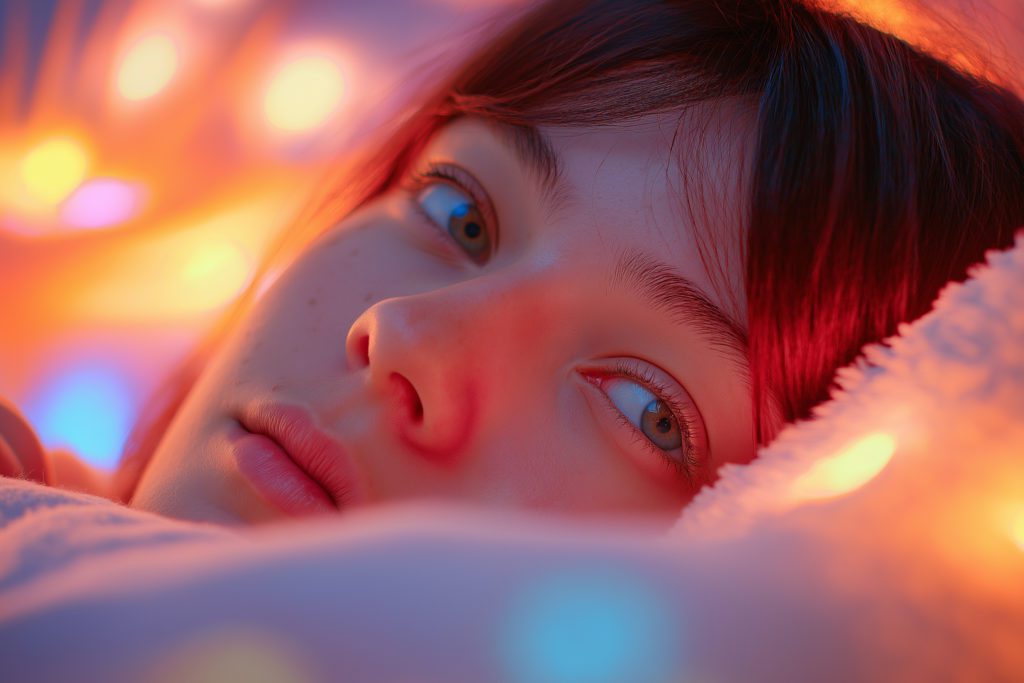
Do Newborns Dream? Insights Into Infant Sleep Patterns
Learn what happens in a newborn’s brain while they’re sleeping and whether or not they dream. Explore how dreams evolve with age.

There’s something so peaceful about a sleeping baby. It’s captivating to watch their eyelids flutter and fingers twitch, to feel their ribs push into you with each inhale. With each movement they make as they sleep, it’s natural to wonder if your newborn can dream and, if they can, what they dream about.
While a newborn doesn’t know how to talk and can’t yet understand what you’re saying, can they visualize as they sleep? We know that they will eventually experience dreams similar to ours, but how do dreams evolve as they develop and absorb more information?
Let’s take a look at infant sleep patterns and explore what is known about newborn dreaming.
Newborn Sleep Cycles
We go through cycles of sleep each night, punctuated by four sleep stages. The first three are non-rapid eye movement (NREM) sleep and then the final stage is REM sleep—it is during REM sleep that most of our dreams occur.
If infants actively dream, it would also be during the REM stage. Coincidentally, this is the stage where newborns spend most of their sleep during their first two weeks of life. For comparison’s sake, adults spend around 20% of their sleep in REM, whereas it’s estimated that newborns spend 50% of their time asleep in the REM stage.
This means that, if newborns do dream, they likely dream a lot when they’re first born.
However, even though we know that adults and older children dream during REM sleep, it doesn’t necessarily mean that infants do as well.
Do Newborns Dream?
Not much is known about childhood dreams before the age when children start talking. This is because dream studies require the dreamer to use words to explain what they see while sleeping, so before a child has the capacity to talk, there’s no way for us to understand what, if anything, they see while they’re asleep.
Still, for dreaming as we know it to occur, neuroscientists have come to a consensus: children must be able to imagine. This means that, for someone to dream as we are used to, they must first be able to construct visually and spatially, which newborns cannot do.
However, some researchers believe that newborns do dream, just not in the same way as we do. Instead, they may dream of sensory experiences from the womb, such as the feeling of being rocked or the sound of their mother’s heartbeat. Others believe a baby’s dream is a jumble of random sensations and images. As they get older, it becomes more like the dreams we are used to, with characters and a plot.
As it stands, all we can do is theorize about if babies dream.
Do Babies Have Nightmares?
Many babies wake from their sleep crying, but is this because of a nightmare?
Experts are pretty unanimous in that, since babies don’t yet grasp the idea of fear, they don’t have nightmares. In fact, they suspect that nightmares don’t start until kids are at least 2, as at this age, they have a better idea of being afraid. A 2-year-old’s imagination is also more active, allowing their mind to conjure a number of things that may linger in the dark.
The American Academy of Pediatrics states that nightmares peak between ages 3 and 12. However, these differ from night terrors, which are most common in preschool-aged children, in that children are unaware of night terrors during and afterward.
Even though researchers are pretty sure that babies do not have nightmares, you may be questioning their opinion when you watch your baby make noises or twitch while sleeping. This movement, called the Moro reflex, is normal, though, and it’s developmentally appropriate. Also known as the startle reflex, this involuntary reflex peaks around one month and then starts to go away after your baby is 2 months.
Infant Sleep Is Active
Even if your newborn can’t yet dream, their mind is still active while they’re asleep. As with adults, sleep is when the mind processes information, storing what is important.
For babies, this time spent asleep allows them to integrate their experiences and increase their knowledge. They’re learning so many new things, and sleep is when their brain can truly process what they learned during their awake hours.
During REM sleep, babies’ brains also build pathways and connections that lay the foundation for key developmental milestones, including language development and motor skills.
So, even if they aren’t dreaming, their brain is still working hard while they’re asleep.
How Infant Dreams Evolve
Dreams evolve as children learn more about themselves and the world around them.
At age three, the pediatric dream researcher David Foulkes found that children could start recounting their dreams, which they describe as static images, often of animals. It isn’t until children turn 5 that they start having more frequent and complex dreams in which they are the main character. Their dreams also begin to include emotions and conversations.
Movement and social interaction begin appearing between ages 5 and 7, and many kids see human characters, especially family members, in their dreams. By age 9, dreams are more like what an adult experiences.
It’s believed that cognitive development can help children process their dreams better, so as they get older, they can better recall their dreams.
Dreams or No Dreams, Infant Sleep is Important
We may never know if infants dream. Those who research dreams rely on volunteers to tell them when they dream and what they dream about—and babies can’t complete this task. We do know, though, that most adult dreaming occurs in REM sleep, a stage in which newborns spend 50% of their time. So, logic suggests that if newborns did dream, they’d dream a lot. However, neuroscientists believe they cannot yet form the abstract thoughts and images needed to dream, although they might dream of different sensations.
Even if infants don’t dream, their brains are busy while they’re sleeping, working through the information it saved during the day and keeping what’s important. Sleep is also when their minds form pathways to aid future development.
To help your baby sleep better, browse the resources available from Pillow for tips on creating an optimal sleep environment and the role of sleep in our health. If you’re ever concerned about how your child moves or acts while sleeping, don’t hesitate to contact your pediatrician with any questions.
FAQ
Do newborns dream?
Newborns likely experience some form of dream-like activity, particularly during REM sleep, which makes up about half of their sleep time. Since REM sleep is associated with dreaming in adults, it’s believed that newborns may have sensory experiences in their sleep, though these differ from the dreams of older children and adults.
What do babies dream about?
Newborns don’t dream in detailed storylines like adults. Since their experiences are limited, they likely experience simpler, sensory-focused dreams involving sensations like light, sound, or warmth rather than complex narratives or familiar faces.
When do babies start dreaming?
Babies display REM sleep patterns from birth, which is typically associated with dreaming. However, true "dreaming" as we know it, with recognizable narratives and characters, likely develops later as babies accumulate memories and cognitive abilities. This developmental phase may coincide with the age when they start understanding and forming images of people, places, and objects.
Why is REM sleep so prominent in newborns?
REM sleep plays a vital role in newborns’ brain development. It supports the formation of neural connections essential for cognitive growth, motor skills, and sensory processing. The high proportion of REM sleep in infants, particularly compared to adults, may be linked to the brain’s active developmental needs during this stage.
Is dreaming beneficial for newborns?
Although the nature of newborn dreams is not fully understood, the role of REM sleep in brain growth suggests that dreaming, or similar activity, supports early cognitive and sensory development. Sleep helps lay the groundwork for future learning, memory processing, and emotional regulation.
How is infant dreaming different from adult dreaming?
Infant dreams are largely sensory, focusing on basic experiences like light, sound, and touch, given their limited interactions with the world. Unlike adults, who often dream in detailed storylines or emotional experiences based on memory and imagination, infants’ dreams lack narrative complexity and personal references. As infants grow and gain more life experiences, their dreams gradually develop, incorporating familiar people, places, and eventually complex emotions, making them more similar to adult dreams over time.
Do newborns have nightmares?
Newborns are unlikely to experience nightmares in the way older children or adults do. Their brains are still developing, and they lack the experiences and complex memories that typically form the basis for nightmares. Most of their dream activity is thought to be simple and sensory-based rather than emotional or fear-driven. As they grow and accumulate more experiences, their dreams—and the potential for nightmares—will evolve.

Written by
Jessica G
Medical writer freelancer who has written hundreds of articles on varying topics. Masters of Engineering degree in Biomedical Engineering.
Download Pillow
Get help
Press & News
Legal
Connect
X (Twitter)
Company
Copyright © Neybox Digital Ltd.



